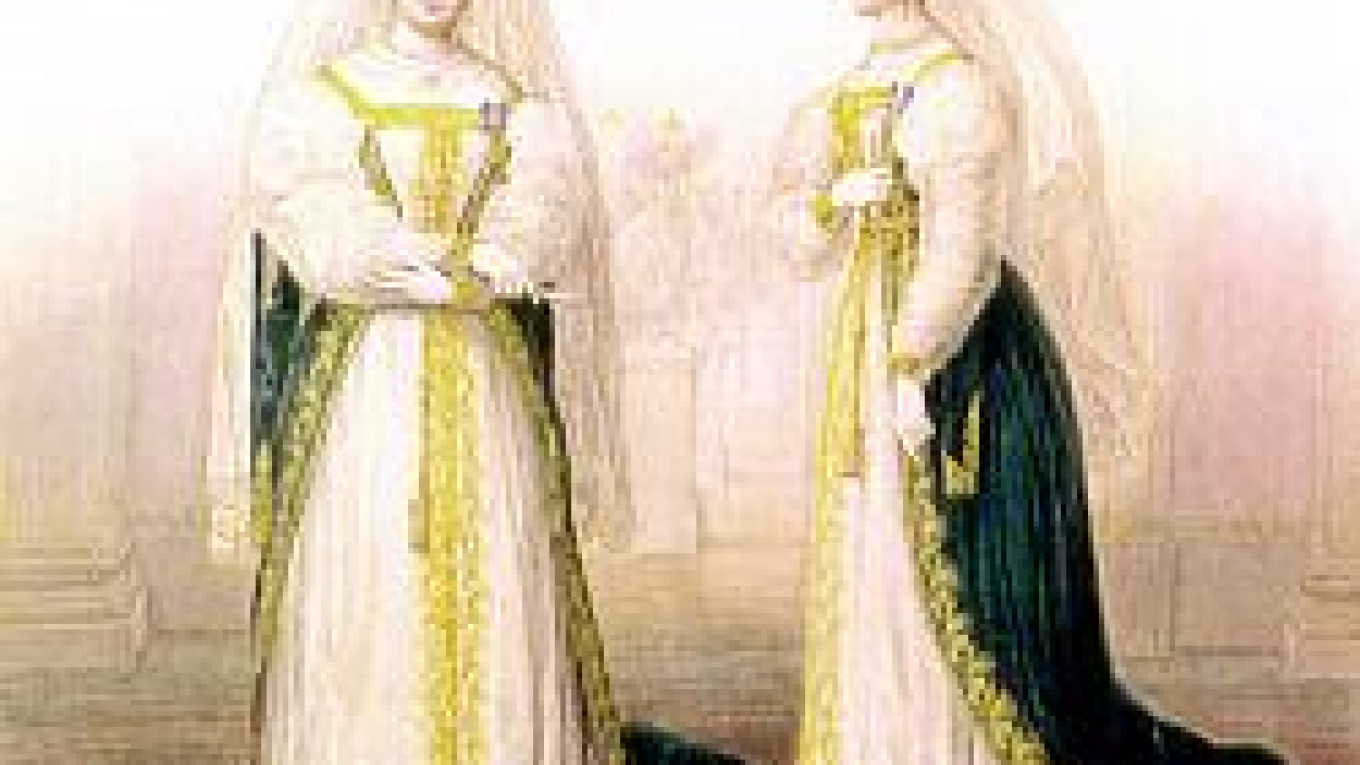In fact, with five female rulers in the 18th century, women played a major role in Russian policy during a period of imperial expansion. Like men, court ladies moved within a complex maze of favoritism and power. Like men, their friendship with the royal family was regarded as service, and rewarded with rank and honorary medals. Even while men occupied the seat of power, as they did throughout the 19th century, the women's court carried on a parallel existence.
Rather than make a case that court ladies had an equal hand in determining Russian policy, however, the exhibit concentrates on the women's sphere. It's a sphere that began rather abruptly in the early 18th century, when Peter the Great made nobility contingent on service to the tsar. In addition to adopting the latest European fashions -- foreign languages, low-cut necklines and all -- women were now to be awarded the Order of St. Catherine, a medal festooned with the exhibit's title, "For Love and the Fatherland."
"The women's theme is one of a spouse's love," said curator Natalia Perevezentseva about the motto. "It's about love for the fatherland and love for the emperor, who is the incarnation of the fatherland. Because Peter was called the father of the fatherland."
Indeed, familial love was initially the basis for the award, whether women received it for their husbands' service or because they were related in some way to the tsar. But family connections could also work against them, Perevezentseva said, pointing to Peter the Great's practice of cutting out the tongues of women whose husbands had been accused of conspiracy.
As time went on, court ladies became increasingly involved in charitable work, for which they could also receive the coveted medal. "The 19th century was a more civilized time in many ways," Perevezentseva said. "By the end of the 19th century, the circle of court ladies was very close to the empress, and court ladies sometimes became the empress' close friends."
Gathered from libraries and museums around the country, the exhibit tracks the evolution of the women's court from its first stabs at Western fashion to the all-out pomp of the mid-19th century. In classical portraits from Catherine the Great's time, young Russian ladies from the Smolny Institute in St. Petersburg hold placards with the sayings, "Do Not Lie," and, "Never Be Capricious." An illustrated pamphlet painstakingly teaches girls how to offer their hand when asked to dance. Other portraits show court ceremony at its height under Nicholas I, who required women to wear Russian-style kokoshnik headpieces encrusted with jewels and heavy pearls, and dresses with puffed sleeves and constrictive bone corsets.
From behind the scenes at the imperial court, the exhibition presents porcelain teacups etched with scenes from popular French romance novels and a box of acrylic paints belonging to Paul I's wife, Maria Fyodorovna, inlaid with a delicate miniature painted by the empress herself. Also on display are notes from Paul I to his mistress, Yekaterina Nelidova, whose rosy-cheeked portrait from 1796 hangs alongside.
All of which would lack context were it not for the diaries and letters that the ladies-in-waiting left behind, recounting their daily cares, gossip and intrigues. Among the most valuable of these, Perevezentseva said, are the memoirs of Anna Tyutcheva, daughter of the 19th-century poet Fyodor Tyutchev and governess to the younger children of Alexander II. With their careful observations and the nearly unlimited access that Tyutcheva enjoyed to the royal family, the memoirs attracted widespread interest when they were finally published.
"The author was extremely gifted from the literary point of view," Perevezentseva said about Tyutcheva's recollections. "Her memoirs are the most successful of all the women memoirists' work."
"For Love and the Fatherland" (Za Lyubov i Otechestvo) runs to Jan. 15 at the Historical Museum, located at 1/2 Red Square. Metro Ploshchad Revolyutsii. Tel. 292-3731.
A Message from The Moscow Times:
Dear readers,
We are facing unprecedented challenges. Russia's Prosecutor General's Office has designated The Moscow Times as an "undesirable" organization, criminalizing our work and putting our staff at risk of prosecution. This follows our earlier unjust labeling as a "foreign agent."
These actions are direct attempts to silence independent journalism in Russia. The authorities claim our work "discredits the decisions of the Russian leadership." We see things differently: we strive to provide accurate, unbiased reporting on Russia.
We, the journalists of The Moscow Times, refuse to be silenced. But to continue our work, we need your help.
Your support, no matter how small, makes a world of difference. If you can, please support us monthly starting from just $2. It's quick to set up, and every contribution makes a significant impact.
By supporting The Moscow Times, you're defending open, independent journalism in the face of repression. Thank you for standing with us.
Remind me later.


